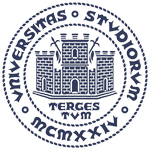European Summer School of Classics. VI EDIZIONE: ALESSANDRO, ALESSANDRIA, ALESSANDRINISMO (approvazione: 2006)
RESPONSABILE (PROPONENTE): Prof. Lucio Cristante.
PERIODO DI SVOLGIMENTO: 14.09.07-22.09.07.
DESCRIZIONE
Con il progetto della European Summer School of Classics, giunto alla SESTA edizione, il Dipartimento di Scienze dell’Antichità (DSA) dell’Università di Trieste, in collaborazione con la Associazione per lo studio e la conoscenza delle culture del mondo antico, ha costituito un polo internazionale di ricerca e didattica nel campo della filologia classica e delle letterature antiche specializzato nelle seguenti attività:
-
favorire le comunicazioni scientifiche, culturali, didattiche fra studiosi e studenti di discipline classiche dell’Europa centro-orientale;
-
arricchire, in ambito cittadino, regionale, interregionale, le relazioni fra Università, Scuole superiori, Istituzioni culturali, Enti locali;
-
promuovere l’informazione e l’aggiornamento sulle prospettive degli studi classici, in senso culturale, professionale, scientifico-tecnologico, in un’epoca di profondo cambiamento del sistema dell’istruzione e della formazione universitaria in Italia e in Europa.
Ai lavori della European Summer School of Classics partecipano docenti, dottorandi e studenti dell’Università di Trieste e di altri Atenei italiani e stranieri; dirigenti scolastici, docenti e studenti dei Licei triestini; studiosi e studenti, cui sarà assegnata una Borsa di Studio, provenienti da sedi universitarie dell’Europa centro-orientale.
Il tema didattico scelto per questa quarta edizione è Vicino e lontano nel Mare Nostrum. II. Dai viaggi degli eroi ai viaggi dei libri. Nel 2002 (23-28 settembre) i lavori erano incentrati su L’eros in Grecia: mito, letteratura e società per l’ambito disciplinare greco, e Originalità e tradizione nella letteratura latina per l’ambito disciplinare latino; nel 2003 (15-20 settembre) su Aspetti culturali e letterari del teatro antico; nel 2004 (13-18 settembre) su Vicino e lontano nel Mare Nostrum; nel 2005 (12-17settembre) su Vicino e lontano nel Mare Nostrum.II. Dai viaggi degli eroi ai viaggi dei libri; nel 2006 (18-23 settembre) Vicino e lontano nel Mare Nostrum.III. Il grande mercato delle parole: migrazioni e trasformazioni delle lingue antiche.
Le attività in calendario consistono in: didattica propedeutica destinata agli studenti dei licei; lezioni tematiche seguite da discussione; sedute di laboratorio di carattere tecnico; letture a leggìo di opere dell’antichità classica e della loro fortuna moderna (es. Edipo re di Sofocle e Edipo e la Sfinge di Hugo von Hofmannsthal); una visita storico-archeologica alla città romana di Aquileia e una, guidata, al teatro romano e ad altri siti di interesse archeologico di Trieste.
The European Summer School of Classics (EUSSC) is promoted by the Department of Classics of the University of Trieste, in cooperation with the Associazione per lo studio e la conoscenza delle culture del mondo antico. Since its very first, and recent, foundation it acts as an international pole of research and didactics in the fields of classical philology, history and archaeology. The European Summer School of Classics mainly aims at:
-
fostering scientific and cultural communication among East European researchers and students of Classics;
-
enchancing relations among universities, high schools, cultural associations and institutions on a local, regional and inter-regional basis;
-
promoting information on the latest perspectives of the classical studies, investigating their cultural, professional and scientific-technological role, in a time of deep changes in the school system and university education both in Italy and Europe.
The European Summer School of Classics will have a mixed audience: participants are expected to be teachers, PhD students and 1st degree students from the University of Trieste as well as from other Italian or foreign Universities, school managers, local high school teachers and students, East European university researchers and students. Moreover the university students from the East Europe will be allowed a grant.
The topic of the forthcoming edition is Mare Nostrum - nearby and far away. II. From travelling heroes to travelling books. The past three editions were held respectively in 2002, 2003 and 2004. In 2002, sessions were held from September 23rd to 28th. The scientific activity (invited lectures, seminars, discussions) focused on two broad - though strongly connected - topics, namely Eros in Greece: Myth, Literature and Society and Originality and Tradition in the Latin Literature, dedicated respectively to the Greek and Roman areas studies. In 2003 (September 15th - 20th), all the activities focused on the topic Cultural and literary aspects of the ancient theatre. In 2004 (September 13th - 18th) the topic chosen was Mare Nostrum - nearby and far away. In 2005 (September 12th - 17th) the topic chosen was Mare Nostrum - nearby and far away. II. From travelling heroes to travelling books. In 2006 (September 18th - 23th) the topic chosen was Mare Nostrum - nearby and far away. III.The great marketplace of words: migrations and transformations of the ancient language.
The School program foresees: introductory sessions specifically destined to high school students; one-topic-speeches followed by discussion; workshops on technical aspects; Oedipus Rex by Sophocles and Oedipus und die Sphinx by Hugo von Hofmannsthal: dramatic readings; historic-archaeological guided tour of the Roman town of Aquileia; guided visit of the Roman theatre and of other archaeological sites in Trieste.
